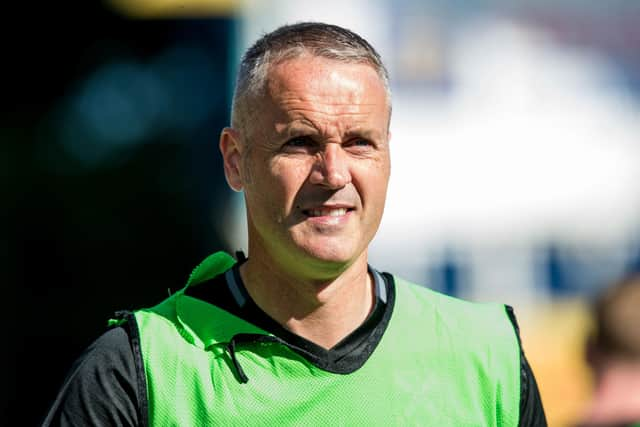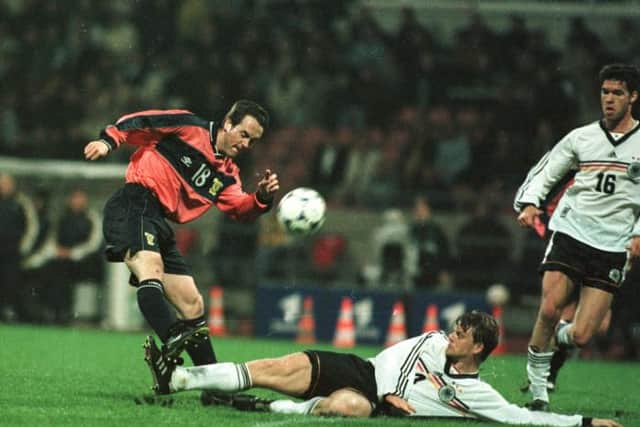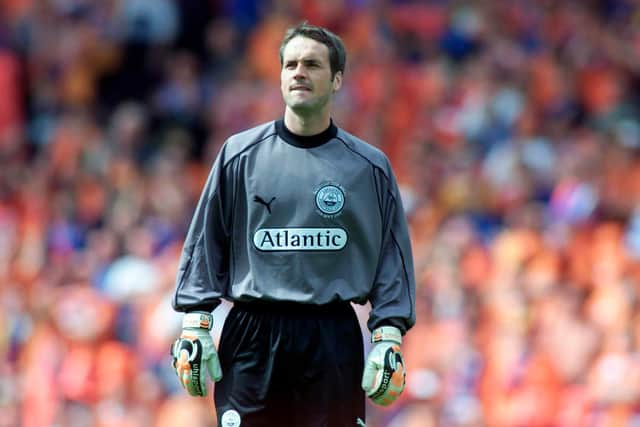How Robbie Winters found a football wonderland in Norway following a road less travelled


Four years in the north-east saw Winters regularly hit double figures and establish himself as one of the top flight’s most effective forwards. There was even international recognition, with Winters winning a cap as a substitute in Scotland’s memorable 1-0 friendly win over Germany in 1999.
Winters left Aberdeen at the age of 27, rejecting a new contract to try his luck elsewhere while he was very much at the peak of his powers after a 14-goal season. Ordinarily, you might expect a player in that position to move on to one or other of the Old Firm, although the presence of players such as Henrik Larsson, Chris Sutton and Ronald De Boer in Glasgow at that time perhaps limited Winters’ appeal.
Advertisement
Hide AdAdvertisement
Hide AdThe other well-trodden path for a provincial star is to make for the gold-paved streets of England, and Winters did take this route – sort of. One match as a trialist at Luton Town was the long and short of the forward’s brief career south of the border, before he took the somewhat unprecedented step of signing for SK Brann, the Bergen-based side which plied its trade in Norway’s Tippeligaen.


And that, as far as the majority of Scottish football fans were concerned, was that. Winters is remembered as a decent striker, and also something of a trivia question after his appearance in goal for Aberdeen in the 2000 Scottish Cup final (Winters replaced the injured Jim Leighton between the sticks after the latter’s second minute injury, and conceded four goals despite making some laudable saves). But for most, his career effectively ended when he left Pittodrie – the move to Bergen removed him from their sight, and therefore from their minds.
However, the six years that Winters spent on Norway’s west coast would prove to be the most memorable spell of his career, as he helped Brann to the kind of success that his former clubs could only dream of.Whilst Brann may not have been the obvious choice for Winters’ next career move, it was perhaps not as far removed from home as it might seem. After all, Aberdeen and Bergen are practically neighbours, divided only by the small matter of the North Sea (and united by a shared dependence on its fossil-fuel riches).
Bergen’s link to Scotland goes much further back than that, though, according to Anders Pamer, a football journalist with Bergen-based media outlet Bergens Tidende. “Even as far back as the Viking era, the people of western Norway have always oriented westwards,” says Pamer. “Bergen later developed as a merchant city, a hub for trade between Norway and the continent. This is why we connect well with the Scots; we have interacted with them, in oh so many ways, for more than a thousand years!”
Winters also arrived to a familiar face in the Brann squad: Cato Guntveit. The Norwegian midfielder had been Winters’ Pittodrie team-mate for three seasons before returning to his former club earlier that summer. However, Guntveit and Winters were arriving at Brann Stadion halfway through Norway’s summer season, and they initially struggled in a side that was nearly relegated. “Robbie was signed to help save Brann, but he was initially a disappointment,” says Pamer. “He was out of shape, he could hardly contribute, and you suspected he had underestimated the level of the Norwegian top flight.”


Brann survived, but only just; a relegation play-off win over Sandefjord gave them, and Winters, a reprieve. Reserve team manager Mons Ivar Mjelde was promoted to the position of first team coach, and tasked with restoring this proud club to a position where it could once again compete at the top end of the table rather than the bottom. The first step on that road was to put his new charges through one of Norway’s famously long pre-seasons: as Winters was about to find out, Norwegian clubs start training in early January and don’t stop until the league kicks off in April. The Scotsman couldn’t help but get fitter in the face of such an onslaught.
Despite their recent travails, Brann were not short of quality during this period. Winters’ team-mates during his time at the club included Norway internationals such as Erik Huseklep (who later played for Portsmouth and Serie A club Bari), Ragnvald Soma (ex-West Ham United) and Martin Andresen (the national team captain and a former Blackburn Rovers player). There were also canny imports, such as Austrian international Paul Scharner, who would go on to have a fine career in England with Wigan Athletic and West Bromwich Albion. A name familiar to Scottish fans is that of Christian Kalvenes, who appears to have enjoyed Winters’ tales of Tannadice given that he moved to Dundee United in 2006.
However, Winters’ most important team-mate in Bergen was probably his strike partner, Norwegian forward Bengt Sæternes. The big frontman had broken through at Bodø/Glimt before an injury-hit spell at Club Brugge. He returned home from Belgium in 2004 with a point to prove, and found a footballing soulmate in the form of East Kilbride’s finest. “Winters formed a sublime partnership with Bengt,” says Pamer. “Bengt was built like a brick house – although, unlike most brick houses, he was very quick! Robbie would spin around with his constant movements and quick sprints and make space for Bengt.”
Advertisement
Hide AdAdvertisement
Hide AdThe zenith of the Winters/Sæternes partnership undoubtedly came in the 2004 Norwegian Cup Final. Brann faced Lyn at the Oslo club’s home Ullevaal Stadion, hoping to lift the cup for the first time in 22 years and for only the sixth time in the club’s history. Within eight minutes, Brann’s red-hot strike partnership had each slotted past Ali Al-Habsi in the Lyn goal to put their side two up, Winters finishing coolly with his right foot before lifting his shirt over his head in celebration.Lyn soon halved the deficit, before Sæternes scored again to make it 3-1 to Brann, and all within 13 minutes. The Norwegian would score a third to seal his hat-trick and ensure the cup returned to Bergen. It must have been a cathartic experience for Winters, the game representing the polar opposite of his previous cup final experience four years earlier. This time, the Scotsman was on the right side of a four-goal haul – perhaps no coincidence given that he was allowed to play at the right end of the pitch.
Winters wasn’t the only familiar Scottish face in the Brann line-up that afternoon. When he was substituted off in the 85th minute, his replacement was compatriot Charlie Miller. The enigmatic former Rangers, Watford and Dundee United midfielder had arrived at Brann that summer, and would ultimately spend two years in Bergen.Whilst his impact was perhaps not as profound as that of Winters, Miller nevertheless soon became a fans’ favourite at Brann Stadion, where the supporters enjoyed both his unquestionable technical ability, and his legendary sense of humour. “Charlie’s talent was outstanding,” says Pamer.
“We knew of his reputation, and there were many jokes about his temper and thirst. I was present at one of his first training sessions when, unbeknownst to Charlie, Robbie had filled his drinking bottle with lager.
“Charlie, sensationally unfit, had just finished a running session, dropped to the ground and desperately gulped down half of the contents of his bottle. The whole team had a laugh as Charlie spat some of it out, quickly re-assessed the whole situation and ended up quietly downing his bottle…!”
The two Bergen-based Scots were a huge hit with the locals, who took to unfurling a large saltire in the stands whenever Brann played. Pamer suggests that both were playing the finest football of their career in Norway – “our pre-seasons even got Charlie fit!”
However, this purple patch in Vestland was not enough to earn either player a second Scotland cap, with the national team managers of the time perhaps making the same mistake Winters had in underestimating the strength of the Tippeligaen. In any event, both men demonstrated their ability to unlock high level defences in the 2005/06 UEFA Cup, as they each found the net against Lokomotiv Moskow. Given the paucity of attacking talent available for the national team at the time, it seems a particularly short-sighted decision to ignore Winters, consistently one of the top strikers in Norway.
Brann’s on-field fortunes were improving year on year, with a sixth-placed finish in 2005 followed by finishing league runners-up in 2006. However, trouble was brewing off the pitch for Brann’s two Caledonian imports.
Both players appeared to have issues with the tactical decisions of coach Mons Ivar Mjelde, and in particular the influence that club captain Martin Andresen (Miller’s direct rival for a starting midfield berth) wielded over team tactics. Given that Mjelde had taken the team from relegation battlers to the very brink of the division summit, there was only likely to be one winner in this dressing room spat.
Advertisement
Hide AdAdvertisement
Hide AdBoth Scots were linked with moves to clubs in Scotland and the English Championship, although Miller as always did things his own way by signing for Belgian side Lierse. Winters, despite reportedly having personal reasons for wishing to return to Scotland, ultimately made peace with Mjelde and stayed on in Bergen.
It would prove to be an excellent decision, because this SK Brann team’s finest hour was still to come. The 2007 season saw Mjelde’s men determined to go one step further than they had done the previous term by lifting the Norwegian title. It didn’t look promising, though, when Winters’ strike partner Bengt Sæternes broke off their blossoming relationship by demanding (and being granted) a transfer mid-season.
Winters, however, was determined not to let the loss of Sæternes derail the Brann charge. “Robbie stepped up, forming a great relationship with Thorstein Helstad,” adds Pamer. “Robbie would operate as the second striker: assisting, making key passes, terrorising defenders with relentless off-the-ball runs.” Winters’ efforts helped Helstad to finish the season as the league’s top scorer and the club’s player of the year – and helped the Brann fans forget all about erstwhile hero Sæternes.
Even more importantly, the newly formed Winters-Helstad partnership fired Brann all the way to the Tippeligaen title, as they finished the season six points clear of Stabæk. It was a sensational achievement, the club’s first league title since 1963 coming just a few short years on from their very real brush with relegation.
Winters had been pivotal to the historic success. “The win in 2007 was unforgettable, and Robbie was key to delivering it,” observes Pamer. “The city had waited 44 years for a league title, so the celebrations were incredible – and Robbie played a big part in those, too. It’s just a shame Charlie Miller wasn’t around any more to enjoy the party…”
That season also saw Brann make their mark on the European stage with a fine UEFA Cup run. They started in the first qualifying round, with Winters contributing 5 goals to a 13-4 aggregate win over Welsh side Carmarthen Town. Brann then defeated Suduva of Lithuania (Winters scoring again) before a memorable away-goals win over Belgium’s Club Brugge saw them reach the group stages – with Winters contributing the crucial goal that took them through.
Despite a tricky draw (Hamburg, Basel, Dinamo Zagreb and Rennes), the Norwegians managed to qualify from the group in third place. Everton proved a bridge too far in the knockout stages, but the men from Bergen could look back on their European run with great pride, and none more so than Winters, whose seven goals had been pivotal in getting them there.
Winters played one final season with Brann before finally packing his bags and returning to Scotland at the end of the 2008 season. Aged 34, it might have been safe to assume that the veteran forward was ready to wind down. However, Winters has since gone on to play for Clyde, Ayr United, Livingston and a host of other semi-pro and Juniors teams, taking his career well into his forties – an impressive longevity which suggests an enduring love of the game. He even managed a brief return to Nordic football during a short spell in Iceland with Grindavik.
Advertisement
Hide AdAdvertisement
Hide AdNothing Robbie Winters achieved in his nearly 20 years in Scottish football comes close to those six magical years he spent in western Norway. He became a legend at SK Brann, writing himself into the history books of the club during its modern heyday. “Robbie’s legacy at Brann is huge,” says Pamer. “From the start of the 2003 season until the day he left some five years later he was a key player, and he is widely considered to be one of the greatest players of arguably Brann’s best era. Off the pitch, he was charming and likeable. On the pitch, he was a relentless running machine up front.”
There’s no doubting that Winters took the road less travelled, eschewing the usual path to Glasgow or England in favour of a new challenge in a league most Scots know nothing about. It was a gamble that paid off immensely, with the striker becoming one of Norway’s finest imports and giving the fans of SK Brann memories that they – and he – will never forget.
This article first appeared in issue 21 of Nutmeg – www.nutmegmagazine.co.uk